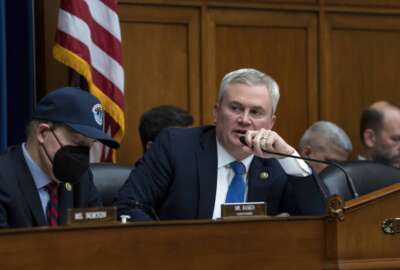
Congressional investigations are heating up. Can career feds protect themselves?
It’s important to prepare for congressional investigations ahead of time, but attorneys said negotiating with Congress and getting liability insurance can prove...
Federal executives are up to bat against the most aggressive oversight from Congress they’ve seen in at least the last several years.
But there are ways to minimize threats of more adversarial investigations, now heightened by a partisan divide between the White House and Congress.
Several attorneys, who have represented employees caught in the middle of these politically-charged situations, emphasized that feds should beef up their defense, as the House Oversight and Accountability Committee launches into its broad investigation agenda.
“Unfortunately, that’s just part of the risk and reality of being a federal employee,” said Chris Keeven, an attorney and partner at law firm Shaw, Bransford & Roth during a Feb. 22 event. “This isn’t something you can necessarily hide from. As the partisan tensions have risen, oftentimes the workforce can be a collateral damage of that.”
It’s more common for senior-level positions, like GS-14 and GS-15 employees at the helm of implementing agency programs, to get entangled in investigations. But it’s not always the case — any federal employee is susceptible to a congressional investigation.
“It’s not just agency heads or other political appointees that get caught up in oversight investigations,” said Justin Shur, a current partner at law firm MoloLamken and former senior Justice Department prosecutor, during the Shaw, Bransford & Roth webinar. “There are plenty of instances where line-level career government employees find themselves in this situation.”
There can be tension between the official agency’s stance and that of an individual employee — and that’s where career feds want to be especially careful.
“The employees can be the casualties of whatever political interests Congress might have, versus the political interests of the political leadership inside each agency,” Keeven said. “When the media and Congress are demanding accountability, what that often means is terminating employees. There’s certainly very real risk of some kind of disciplinary or termination action being taken against you.”
An agency’s Congressional Affairs Office and Office of General Counsel are typically the liaisons between the agency and congressional staff during an investigation. But it’s important to remember, the attorneys said, that these offices think and act in favor of the agency as a whole, and are not necessarily looking out for individual employees.
“It’s really important to have a good relationship with the agency’s Office of General Counsel or the Congressional Affairs Office,” said Eric Nitz, a partner at law firm MoloLamken, during the Shaw, Bransford & Roth event.
Federal employees can get called into committee hearings to testify as fact witnesses, but beyond the hearings themselves, subsequent legal proceedings can come from what an employee said during a hearing. From there, agencies may look to hold people accountable, and take disciplinary action like terminating or separating employees.
Before getting to that point, there are several ways employees can protect themselves and hedge against these adverse actions. For one, employees can try to negotiate behind closed doors with congressional staff — it’s a lower stakes alternative to sharing information during a hearing. No surprise, the attorneys added that getting personal counsel can help navigate these types of discussions and negotiations.
“It’s important to know that you do have the right to private counsel, to have someone who can advise you and look out for your interests,” Keeven said. “For any federal employee who does testify, you are entitled to have private counsel represent you and attend the interview with you.”
But of course, lawyers are expensive. The attorneys said they highly recommend getting professional liability insurance. This type of insurance provides legal protection to managers, supervisors, law enforcement officers and other eligible federal employees during civil lawsuits, administrative investigations — including congressional investigations — and criminal investigations.
It’s typical to get more questions about professional liability insurance when partisan power flips in a congressional chamber, said Tony Vergnetti, president and founder of FEDS Protection Insurance Company.
When an investigation arises, feds who have professional liability insurance get access to a lawyer.
“[The lawyer will] prepare you for the actual investigative interview, attend it with you and in the unfortunate event there’s any sort of personnel action that your agency might want to take against you, the insurance would provide a legal defense for that as well,” Vergnetti told Federal News Network.
Agencies can reimburse up to one half of the cost of insurance for managers, supervisors and law enforcement officers. For certain intelligence agency employees, the insurance is 100% reimbursable. After reimbursement, the insurance costs about $150 annually, according to Vergnetti.
“They’re all dedicated, well-intended civil servants. They’re not thinking they’re going to do anything wrong. They’re not thinking the agency’s not going to have their back. They’re not wired to think they need this kind of insurance,” Vergnetti said, adding that it’s better to act sooner rather than later.
“The time to get your homeowners insurance is not after the National Weather Service names the hurricane,” he said.
“Your [private counsel] is going to be the one who is going to be looking out for your interests,” Keeven added. “You don’t want to get too far down the path before you realize that the path is treacherous.”
Although getting insurance and preparing ahead of time are helpful for federal employees prior to investigations and hearings, what happens when an employee is actually in the hearing room surrounded by Congress members, cameras, press and an attentive audience?
There are plenty of other ways that federal employees can protect themselves and come out of a hearing relatively unscathed, according to the attorneys.
Stay on message
With only a few minutes each for questioning, committee members will regularly interrupt witnesses to try to save time, especially if they have a politically charged agenda that they want to get across.
“You can end up with your testimony going sideways, and being about something that has actually nothing to do with what you even have personal knowledge of,” said Shur, partner at law firm MoloLamken.
Consistently and repeatedly delivering a message is essential to federal employees during a committee hearing.
“You need to know exactly what message you want anyone watching the hearing to take away from your testimony,” Shur said.
Notably, federal employees may invoke their fifth amendment rights, and not answer a question from a member. But “taking five” can be a double-edged sword.
“There is definitely a reputational hit with asserting the fifth amendment at one of these hearings,” Nitz, partner at law firm MoloLamken, said. “It really is a situation where you need to balance the negative publicity and the reputational hit, against the risk that testifying is going to yield evidence that could be used against you in a criminal proceeding — or that the congressional testimony itself serves as the basis for a criminal prosecution when there was none before.”
Reject false choices
A common tactic that committee members will use in questioning, often to help maximize their time, is demanding a cut-and-dry “yes” or “no” answer from a witness. But that can often be misleading and leave out valuable context and information, attorneys said. This type of pressure can also push a witness to validate a perspective that may not be completely factual.
“Whether it’s intentional or not, these questions also often presuppose certain facts, which may be untrue or unproven. By giving a yes or no answer in the moment, a witness may inadvertently accept those false suppositions which could damage their reputation, it could damage their credibility, it can even create liability for them,” Shur said.
Under that pressure, instead of validating a perspective that may not be factual, witnesses should try their best to provide more context.
“A witness should challenge, or at least correct, the premise of the question and explain that the question can’t be answered with a simple yes or no,” Shur said.
It’s easier said than done, he added, but it can prove highly effective.
“We’ve had clients who have really stuck to their guns and have been successful in that area,” Shur said.
Stay in your lane
In a courtroom, under the rules of evidence, a fact witness’ testimony is limited to their personal knowledge of the events at hand. But in a congressional hearing, those rules don’t apply, meaning committee members have much more leeway.
“Members will routinely invite witnesses to speculate or offer their opinion on matters that are completely outside the witness’s personal knowledge or expertise,” Shur said.
For example, witnesses may choose to answer a question from a committee member that’s outside the scope of the investigation. If the information they provide is later proven inaccurate, or conflicts with their agency’s official position on an issue, that federal employee could then be at risk of an adverse action from their agency.
“This is an area where witnesses could get themselves, and often do get themselves, in trouble,” Shur said.
Instead, witnesses should try to tell members simply that answering a question is outside their field of expertise.
“Members might not like that answer, but oftentimes, they just accept it and move on,” he said.
Don’t take the bait
Often in congressional hearings, committee members will frame their questions for the camera. For this type of “political theater,” Shur said don’t react — don’t say or do anything.
“Members will try to provoke an emotional response from the witness, in large part, because it creates sort of a memorable soundbite,” Shur said. “Maintaining that controlled verbal and body language is essential.”
Many of these tips are just the starting point. It can take weeks or months, to get fully prepared in advance of an investigation or hearing. Experts also offered insight to Federal News Network on how to prepare for investigations ahead of time.
“In our experience, a successful appearance before Congress at one of these high-profile hearings is a result of hours of preparation,” Shur said. “By understanding the process and preparing, witnesses can successfully navigate these hearings.”
Copyright © 2025 Federal News Network. All rights reserved. This website is not intended for users located within the European Economic Area.
Drew Friedman is a workforce, pay and benefits reporter for Federal News Network.
Follow @dfriedmanWFED





